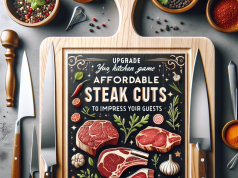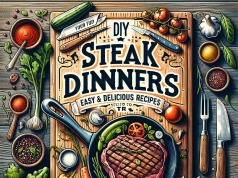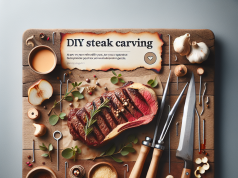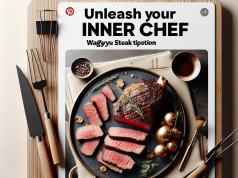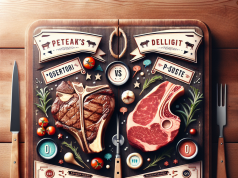Contents
Mastering medium-rare: Why this steak temperature reigns supreme
Introduction content goes here…
🔥Premium Angus Beef T-Bone – SHOP NOW🔥
Mastering Medium-Rare: Why this Steak Temperature Reigns Supreme
Introduction
Insert introduction paragraph here…
Benefits of Medium-Rare Steak
Medium-rare steak is widely considered by many experts as the ideal temperature to cook your steak to perfection. Here are a few reasons why:
- Juiciness: Cooking a steak to medium-rare allows the center to retain a significant amount of moisture, resulting in a juicier and more flavorful steak.
- Tenderness: The shorter cooking time required for medium-rare steak ensures that the meat remains tender, without becoming tough or chewy.
- Flavor Development: Achieving medium-rare allows the steak to develop a well-rounded flavor profile, with a good balance of seared crust and pink, succulent interior.
Cooking Technique
Mastering the perfect medium-rare steak requires attention to the cooking technique. Here are the steps to follow:
- Preparation: Start by seasoning your steak with salt and pepper, or any other preferred spices.
- High Heat Sear: Heat a cast-iron skillet over high heat until it’s smoking hot. Place the steak in the skillet and let it sear for 1-2 minutes on each side.
- Finish in the Oven: Transfer the skillet with the seared steak to a preheated oven. Cook the steak for an additional 3-4 minutes until it reaches the desired doneness of medium-rare.
- Resting: Remove the steak from the oven and let it rest for a few minutes to allow the juices to redistribute within the meat.
- Slice and Serve: Finally, slice the steak against the grain and serve it with your favorite sides.
Expert Tips for Perfect Medium-Rare
To further enhance your medium-rare steak experience, here are a few expert tips:
- Cooking time may vary depending on the thickness of the steak, so it’s recommended to use a meat thermometer to ensure precise doneness.
- Letting the steak come to room temperature for about 30 minutes before cooking allows for more even cooking.
- For a flavorful twist, consider adding a pat of herb butter or a drizzle of balsamic reduction during the resting period.
- Experiment with different cuts of steak to discover your personal preference for medium-rare.
Conclusion
To sum it up, mastering medium-rare steak allows you to experience the juiciest, tenderest, and most flavorful steak imaginable. Its careful balance of seared crust and succulent interior is a testament to the art of steak cooking. So, the next time you fire up the grill or heat up your skillet, aim for medium-rare perfection and enjoy a culinary delight!
For more detailed cooking techniques and tips, check out our related post on achieving the perfect medium-rare temperature.
Frequently Asked Questions – Mastering medium-rare: Why this steak temperature reigns supreme
Q: What is medium-rare steak?
Medium-rare is a degree of doneness when cooking steak. It refers to a steak cooked to an internal temperature of 135-145°F (57-63°C), with a warm red center.
Q: Why is medium-rare considered the best temperature for steak?
There are several reasons why medium-rare is often considered the optimal temperature for steak:
- Flavor: Medium-rare steaks retain a juicy and flavorful profile. The internal temperature allows the meat to cook evenly, preserving the natural juices and tenderness.
- Tenderness: Cooking a steak to medium-rare ensures that it remains tender. The gentle heat allows the muscle fibers to relax without overcooking.
- Texture: Medium-rare steak offers a pleasant texture with a slight char on the outside while maintaining a soft and succulent interior.
- Safety: When cooked to medium-rare, the steak reaches a sufficient temperature to kill most bacteria and pathogens present on the surface, reducing the risk of foodborne illnesses.
Q: Are there any health concerns associated with eating medium-rare steak?
When prepared and cooked properly, medium-rare steaks pose minimal health risks. It is important to source high-quality meat and follow proper hygiene and cooking guidelines to ensure safety. If you have specific health concerns or dietary restrictions, consult with a medical professional or nutritionist.
Q: How do I achieve a perfect medium-rare steak?
To master medium-rare steak, follow these steps:
- Choose a high-quality cut of steak.
- Allow the steak to come to room temperature before cooking.
- Preheat your grill or skillet to medium-high heat.
- Season the steak with salt, pepper, and any desired spices.
- Cook the steak for approximately 3-4 minutes per side, depending on thickness.
- Check the internal temperature with a meat thermometer, aiming for 135-145°F (57-63°C).
- Remove the steak from heat and let it rest for a few minutes before slicing and serving.
Q: Can I request a different degree of doneness at a restaurant?
Yes, most restaurants are flexible with steak doneness preferences. You can request a different degree of doneness such as rare, medium, or well-done. However, medium-rare is generally the recommended temperature due to its balance of flavor, tenderness, and safety.
What is the Best Medium Rare Steak Temperature?
Overview
When it comes to cooking the perfect steak, achieving the ideal temperature is crucial. Among various doneness levels, medium rare is a popular choice for steak lovers who enjoy a juicy and tender bite. So, what exactly is the best medium rare steak temperature?
The Perfect Medium Rare Steak Temperature
For a medium rare steak, the recommended internal temperature is around 130°F (54°C) to 135°F (57°C). This temperature range provides a beautiful pink center, accompanied by a seared and flavorful crust on the outside.
Why Choose Medium Rare?
Medium rare is often favored by steak enthusiasts because it offers both tenderness and flavor. The steak is cooked to the point where the proteins have denatured like in higher temperature doneness levels, but still retains the juiciness due to the shorter cooking time.
How to Achieve Medium Rare Perfection
To cook your steak to a medium rare perfection, follow these simple steps:
- Preheat your grill or skillet to high heat.
- Season your steak with salt, pepper, and any desired spices.
- Place the steak on the hot grill or skillet and sear for a couple of minutes on each side.
- Reduce the heat to medium and continue cooking until the internal temperature reaches 130°F to 135°F (54°C to 57°C).
- Remove the steak from the heat and let it rest for a few minutes before serving. This allows the juices to redistribute and ensures maximum tenderness.
Remember, cooking times may vary depending on the thickness of the steak and personal preferences, so using a meat thermometer is always recommended to ensure the desired doneness level.
Want to Learn More?
If you are curious to learn more about steak and its doneness levels, you can check out the Steak article on Wikipedia.
Premium Angus Beef T-Bone – SHOP NOW
What is medium-rare?
- Medium-rare is a cooking term referring to the doneness level of a steak.
- It means the steak is cooked to an internal temperature of 135-145°F (57-63°C).
The appeal of medium-rare steak
- Medium-rare steak offers the perfect balance between tenderness and flavor.
- The meat is still juicy and retains its natural flavors.
- The internal temperature allows for a slight pink or red center, providing visual appeal.
Health benefits of medium-rare steak
- Cooking steak to medium-rare allows the nutrients to be preserved.
- Steak cooked at higher temperatures can lead to the formation of harmful compounds.
Tips for achieving the perfect medium-rare steak
- Use a meat thermometer to ensure the accurate internal temperature.
- Let the steak rest after cooking to allow the juices to redistribute.
- Experiment with different seasoning and marinade options to enhance the flavor.
Category – STEAKS, BURGER & MEATS





























